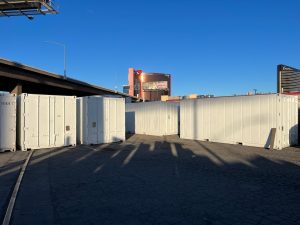 High temperatures in Las Vegas summers pose a significant threat to HVAC units and refrigeration storage units. This is especially concerning for establishments such as grocery stores, large hotels and casinos, restaurants, pharmacies, food pantries, and large event venues that heavily rely on these units to preserve their perishable goods. It is imperative for these businesses to have a backup plan and a reliable source for large refrigerated and cold storage units in case of unit failure at any time throughout the year.
High temperatures in Las Vegas summers pose a significant threat to HVAC units and refrigeration storage units. This is especially concerning for establishments such as grocery stores, large hotels and casinos, restaurants, pharmacies, food pantries, and large event venues that heavily rely on these units to preserve their perishable goods. It is imperative for these businesses to have a backup plan and a reliable source for large refrigerated and cold storage units in case of unit failure at any time throughout the year.
Apart from the risks associated with unit failure, businesses also face downtime during remodels and unit replacements, further emphasizing the need for a backup system. TCI Event Rentals understands these challenges and offers multiple 20ft and 40ft walk-in refrigeration and cold storage units to cater to the specific needs of these businesses. While availability may be limited during large events in Las Vegas, TCI Event Rentals is dedicated to assisting in emergency situations where one or more refrigeration units break down.
To address such emergencies, simply contact TCI Event Rentals at 702-604-8111 and provide details regarding the amount of storage space required and the approximate duration for which the units will be needed. TCI Event Rentals recognizes the critical role that cold storage facilities play in preserving temperature-sensitive products, and numerous businesses in southern Nevada heavily rely on these facilities to maintain the quality and integrity of their goods.
Here are some southern Nevada businesses that require large amounts of cold refrigerated storage and would greatly benefit from reviewing the exceptional cold storage units available from TCI Event Rentals. By adding us to their list of contacts for emergency situations, these businesses can ensure uninterrupted operations and efficiently handle any unexpected refrigeration needs.
Hospitals and Healthcare Facilities:
- Cold Storage Need: Hospitals store vaccines, medications, blood products, and organs in refrigerated units.
- Importance of Backup: A power outage or system failure could jeopardize patient care. Backup generators and redundant cooling systems are essential to maintain critical supplies.
Food Distribution Centers and Warehouses:
- Cold Storage Need: These facilities store perishable food items, including fresh produce, dairy, and frozen goods.
- Importance of Backup: A breakdown in refrigeration could lead to food spoilage, affecting supply chains and food security. Backup power and temperature monitoring are vital.
Food Banks and Nonprofit Organizations:
- Cold Storage Need: Food banks store donated perishable items to distribute to those in need.
- Importance of Backup: A malfunction could result in food waste, impacting vulnerable populations. Backup systems ensure uninterrupted food distribution.
Restaurants and Catering Services:
- Cold Storage Need: Restaurants store ingredients, prepped meals, and desserts in refrigerators and freezers.
- Importance of Backup: A sudden failure could disrupt operations, leading to financial losses. Backup units prevent food spoilage and maintain quality.
Hotels and Resorts:
- Cold Storage Need: Hotels store perishable items for their restaurants, bars, and room service.
- Importance of Backup: Guests’ dining experiences depend on fresh ingredients. Backup systems prevent food waste and maintain guest satisfaction.
Casinos and Entertainment Venues:
- Cold Storage Need: Casinos and theaters store beverages, ice, and perishable snacks.
- Importance of Backup: A cooling system failure during events could impact revenue and customer experience. Backup plans ensure uninterrupted service.
Stadiums and Sports Arenas:
- Cold Storage Need: These venues store concessions, including beverages and frozen treats.
- Importance of Backup: During games or concerts, a refrigeration breakdown could lead to unhappy fans. Backup systems maintain product quality.
Schools and Universities:
- Cold Storage Need: Educational institutions store cafeteria supplies, including fresh produce and dairy.
- Importance of Backup: A system failure could disrupt meal services for students. Backup plans prevent food shortages and maintain nutrition.
Race Tracks and Motorsports Facilities:
- Cold Storage Need: These venues store beverages, ice, and food for concessions.
- Importance of Backup: During races or events, a cooling system failure could impact revenue. Backup refrigeration ensures uninterrupted service.
Pharmaceutical Companies and Laboratories:
- Cold Storage Need: Pharmaceuticals, vaccines, and research samples require precise temperature control.
- Importance of Backup: A failure could compromise drug efficacy or research integrity. Backup systems protect critical supplies.
Grocery Stores and Supermarkets:
As essential providers of daily necessities, grocery stores and supermarkets in southern Nevada must maintain a consistent supply of perishable goods. By incorporating TCI Event Rentals’ cold storage units into their emergency planning, these businesses can ensure minimal disruption in the event of power outages or equipment failures, preventing spoilage and guaranteeing customer satisfaction.
Event Planners and Organizers:
Southern Nevada is renowned for its vibrant entertainment and event industry. Whether it’s large-scale conventions, festivals, or concerts, event planners and organizers often require temporary cold storage solutions for food and beverages. TCI Event Rentals’ units provide the flexibility and reliability needed to ensure the success of these events, even in emergency situations.
By including TCI Event Rentals in their emergency contacts, these southern Nevada businesses can rest assured that their cold storage needs will be promptly addressed. With our extensive range of high-quality units, exceptional customer service, and quick response times, TCI Event Rentals is the ideal partner for any emergency refrigeration requirements in the region.
In summary, backup plans for emergency cold storage are essential to prevent disruptions, financial losses, and compromised product quality. These businesses must invest in redundant systems, temperature monitoring, and disaster preparedness to ensure uninterrupted operations.
